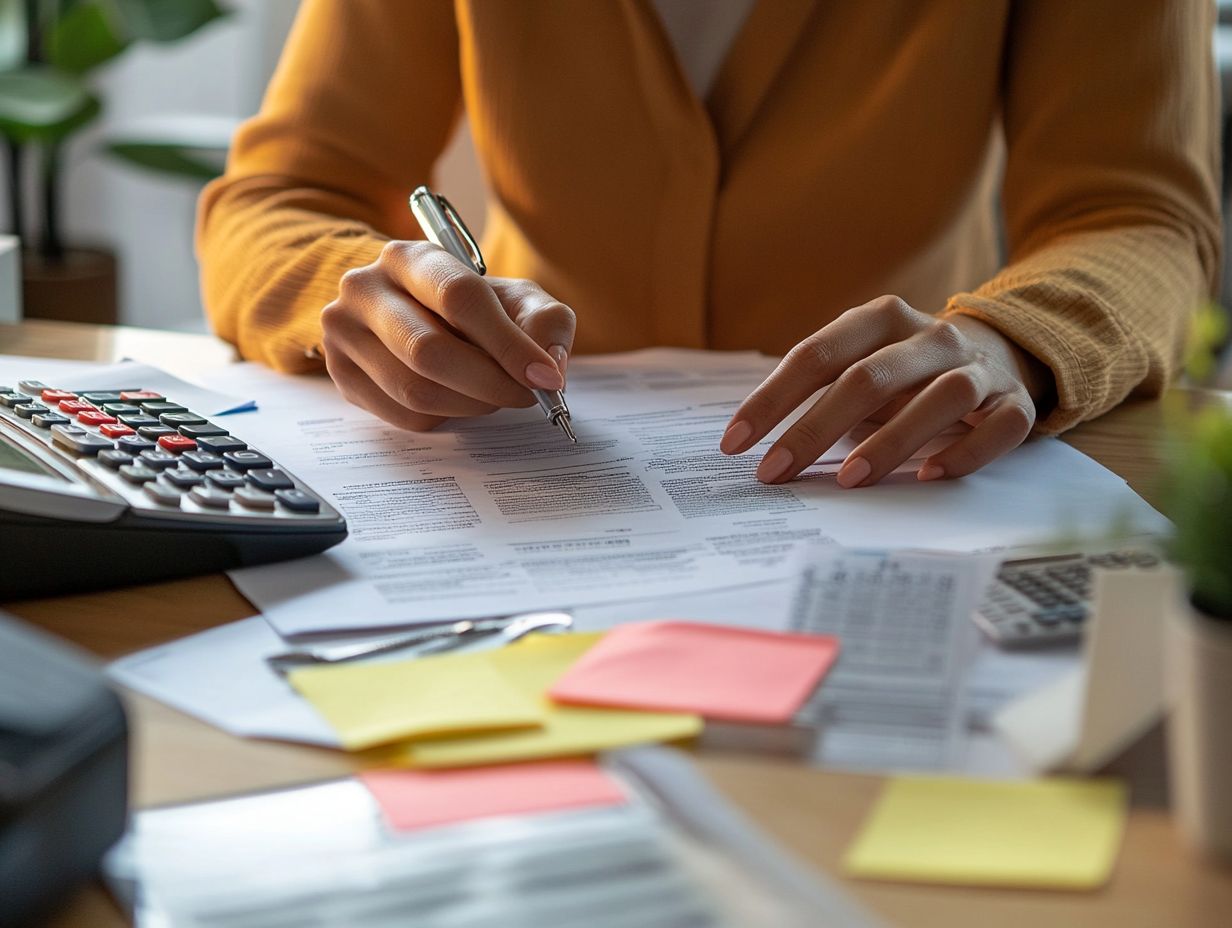Guide to Understanding Car Loan Terminology
Navigating the world of car loans can seem overwhelming, especially with all the jargon that comes along for the ride.
Understanding key terms like interest rate, principal, and down payment is essential for making informed decisions. This guide breaks down the common terminology used in car loans, ensuring you re well-equipped to interpret offers and compare options with ease.
You’ll explore important factors to consider when choosing a car loan, from your credit score to repayment strategies. Prepare to drive confidently into your financing journey!
Contents
Key Takeaways:

Understanding car loan terminology is crucial when considering a car loan. Key terms like interest rate, principal, and down payment can greatly impact the overall cost of the loan.
Factors such as credit score, loan comparison, and payment options should be taken into account when choosing a car loan. These can greatly affect the interest rate and repayment strategy.
Amortization and equity are important concepts to understand in a car loan. These determine how much of each payment goes towards the principal and how much goes towards interest.
What is a Car Loan?
A car loan, also known as an auto loan, is a financial tool that enables you to finance the purchase of a vehicle through a lender. Typically, you ll borrow a principal amount that you agree upon. You will pay this back over a specified loan term, including interest.
The beauty of an auto loan is that it s usually secured by the vehicle itself. This means the lender holds a lien on your new ride until you ve paid off the loan in full. This mitigates their risk and allows you to drive away in the vehicle of your choosing.
When you re contemplating a car loan, you ll find various types to consider, such as fixed-rate and variable-rate loans.
- Fixed-rate loans allow you to enjoy the peace of mind that comes with consistent monthly payments. The interest rate remains unchanged throughout the term, perfect for maintaining your budgeting stability.
- Variable-rate loans, on the other hand, can fluctuate with market conditions. They might start with lower initial payments, but they carry the risk of increasing costs down the line.
The annual percentage rate (APR) is the yearly cost of borrowing money, including interest and fees. It plays a crucial role in determining your overall borrowing costs. Remember that your credit history significantly influences your chances of loan approval and the terms you re offered, including the repayment duration.
Make the right choice now, and you could be driving your dream car sooner than you think!
Common Terminology Used in Car Loans
Grasping the common terminology associated with car loans is essential for borrowers aiming to navigate the auto financing process with confidence, and you can find valuable insights in the ultimate guide to car loan terms.
Terms like ‘annual percentage rate’ (APR), ‘down payment,’ and ‘credit score’ form the backbone of evaluating loan options. They guide you in understanding the car financing timeline and help you grasp the total cost and affordability of purchasing a vehicle.
Understanding concepts such as ‘trade-in value’ and ‘lender rates’ can impact your financing options. This knowledge gives you the power to make more informed and strategic decisions.
Interest Rate
The interest rate on an auto loan is a crucial element that dictates the overall cost of borrowing, typically expressed as an annual percentage rate (APR). This rate can fluctuate based on the lender you choose, your creditworthiness, and the type of loan whether you opt for a fixed-rate or a variable-rate option.
Understanding how these rates are computed gives you the power to make savvy decisions. Several factors, including your credit score, loan terms, and current market conditions, significantly influence the final interest rate.
For example, a higher credit score usually means lower rates, indicating to lenders that you present a reduced risk. Additionally, external economic factors such as inflation and central bank policies can cause rate fluctuations that directly impact borrowers like you.
Consequently, it’s essential for you to compare rates from various lenders. Doing so ensures that you secure the most favorable financing terms. This diligence could potentially save you thousands over the life of your loan.
Principal
The principal amount in an auto loan is the initial sum you borrow. This amount, along with interest, shapes the total vehicle cost. It’s crucial to understand this when evaluating financing options.
Knowing how the principal impacts monthly payments is vital. Higher amounts lead to increased repayment burdens and strain on finances.
Your payment history can significantly impact your credit score. It’s essential to consider your debt-to-income ratio, which compares your total debt to your income. Lenders use this to assess if you can handle additional financial responsibilities.
By gaining insight into these elements, you can navigate your auto loan decisions with confidence.
Down Payment

A down payment represents a slice of the vehicle’s purchase price that you pay upfront. This reduces the amount you need to finance through an auto loan.
When you make a substantial down payment, you enjoy lower monthly payments and increase your chances of securing favorable financing terms.
A larger down payment unlocks the potential for a higher vehicle value, giving you more flexibility if you consider refinancing your auto loan in the future.
This strategic move lightens your financial load and establishes a solid foundation for long-term stability.
Loan Term
The loan term is the period during which you agree to repay your auto loan, typically spanning from 36 to 72 months. Opting for a longer loan term may lower your monthly payments, but it could inflate the total cost due to accruing interest.
While those monthly payments may seem easier to manage, the interest rate tends to be higher. Lenders factor in the extended risk associated with longer repayment periods.
It s essential to evaluate your payment-to-income ratio carefully. Ensure that even with lower payments, you can comfortably meet your other financial obligations.
On the flip side, shorter loan terms generally come with higher monthly payments but significantly reduce the total interest paid, fostering a healthier financial environment.
Amortization
Amortization is the process of gradually paying off a loan through scheduled monthly payments that encompass both principal and interest. Understanding how amortization works is essential for you as a borrower.
This structured approach reveals how your payments impact the remaining balance and the overall cost of the loan. Initially, a significant portion of each payment goes toward interest.
However, over time, a larger share of your payments chips away at the principal, effectively shrinking the outstanding balance.
Lenders typically provide an amortization schedule that clearly outlines the breakdown of each payment, allowing you to understand your financial commitments and plan accordingly.
Understanding Equity
Equity in an auto loan is the difference between your vehicle’s market value and the outstanding loan balance. This represents your stake in the vehicle.
As you pay down the loan, your equity typically grows. However, if the vehicle depreciates quickly, this may not hold true.
Why Equity Matters
Understanding equity is crucial when considering financing options. Sufficient equity can qualify you for auto equity loans.
These loans can help you secure additional funds when unexpected expenses arise, leveraging your vehicle s value.
Factors to Consider When Choosing a Car Loan
Selecting a car loan requires careful consideration of key factors. You’ll want to make informed financing decisions.
Pay attention to your credit score and the types of payment options available. These can greatly impact your vehicle’s total cost.
Credit Score

Your credit score is a snapshot of your creditworthiness. It plays a key role in how lenders assess your eligibility for an auto loan.
A higher FICO score puts you in a strong position to secure better interest rates. A lower score, on the other hand, can make financing more challenging.
It s important to maintain a good credit score to qualify for favorable loan terms. Lenders will review your credit history to see how well you manage payments.
Factors like managing your debts effectively strengthen your application. Thanks to fair lending laws, your background won t unfairly affect your evaluation.
Regularly monitoring your credit profile and practicing good credit habits can improve your standing. This opens doors to better borrowing options.
Loan Comparison
Comparing auto loans is vital to find the best financing option for your needs. Look at interest rates, loan amounts, and lender reputation.
Examine the total loan cost over time, including monthly payments and hidden fees. Diving into the details can reveal critical information affecting your finances.
This knowledge empowers you to make informed decisions that minimize costs and secure the best deal for your situation.
Payment Options
When considering an auto loan, evaluate your payment options carefully. Knowing your choices helps manage your financial responsibilities.
Options usually include standard monthly payments or bi-weekly payments. You may also consider making extra payments to reduce your principal faster.
Choosing bi-weekly payments can lower total interest costs. Making extra payments decreases your principal, cutting down future interest.
A strong payment history can enhance your credit score, unlocking better terms for future loans.
Familiarize yourself with any debt cancellation policies to prepare for unexpected challenges.
Loan Repayment Strategies
Developing effective loan repayment strategies is essential for meeting your financial obligations while keeping interest costs in check. Consider options like making additional payments or refinancing your auto loan. You may also want to adjust your monthly payment plans based on your current financial situation.
Exploring choices such as credit disability insurance can serve as a valuable safety net in case of unexpected events, helping you maintain timely repayment schedules. It’s crucial to take into account the principal amount and its impact on overall costs, especially when facing a large payment due at the end of your loan term.
Evaluating your payment-to-income ratio can provide insights into your current repayment capabilities. This can highlight necessary adjustments to keep you on track without overspending. By utilizing these strategies, you can navigate your repayment journey with increased confidence and financial prudence.
Take charge of your financial future today!
Frequently Asked Questions
What is a car loan?

A car loan is a type of financial product used to finance the purchase of a vehicle. It allows you to borrow money from a lender and pay it back with interest over a set period of time.
What is the difference between a secured and unsecured car loan?
A secured car loan is backed by collateral, usually the vehicle itself, while an unsecured car loan does not require collateral. If you default on a secured loan, the lender can repossess the vehicle to recover their losses.
What is the annual percentage rate (APR) on a car loan?
The annual percentage rate, or APR, is the annual rate charged by the lender for borrowing money. It includes both the interest rate and any additional fees or charges associated with the loan.
What is a down payment?
A down payment is a portion of the purchase price that you pay upfront when taking out a car loan. It is typically expressed as a percentage of the total purchase price. A larger down payment can help reduce the loan amount and the interest you will pay over time.
What is the difference between a fixed and variable interest rate on a car loan?
A fixed interest rate remains the same throughout the loan term, while a variable interest rate can change over time. With a fixed rate, your monthly payments will stay the same, whereas a variable rate could potentially increase or decrease.
What is the loan term on a car loan?
The loan term refers to the length of time you have to repay the loan. It is expressed in months and can range from 24 to 84 months, depending on the lender and your creditworthiness. A longer loan term may result in lower monthly payments but can lead to paying more in interest over the life of the loan.






